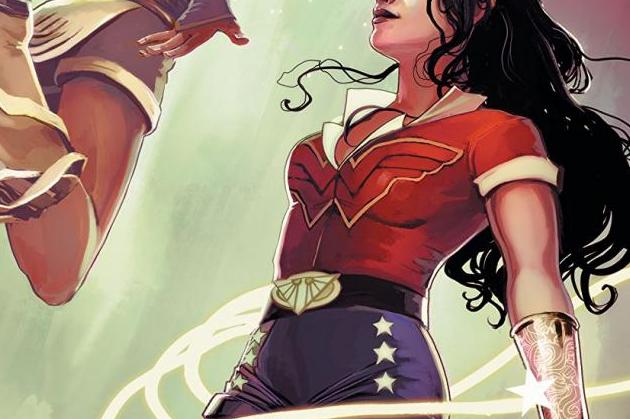Bombshells United #2
Writer: Marguerite Bennett
Artists: Marguerite Sauvage and Marcelo DiChiara
Colorist: J. Nanjan
Published by: DC Comics
The title of this story arc, “American Soil”, has already had a few different connotations with Bombshells United. First off, it represents the uneasy decision of the American government to intern Japanese Americans during World War II simply for being Japanese, thus bringing the war, in a matter of speaking, to their own shores. Second, it perfectly describes the ancillary villain to this story, introduced in the final pages of issues one: Clayface!
As we begin this second issue, Clayface makes a pretty bold accusation to Wonder Woman after she helped future Japanese internees escape from an American transport: she was supposed to be the American’s hero, not theirs. Her rebuke to this accusation is quite simple: she is the stranger to this country, they are Americans and he is the one who has forgotten this simple, inescapable fact. Current political allegory aside, it’s a very strong, true statement.
Back at the new makeshift camp, Dawnstar, Yuri, Yuki and Emily Sung, are busy building fortifications to protect themselves from anyone who may come after them after the daring train heist. Here again we are reminded that this is quite similar to the internment camps, but with one giant difference: they chose to surround themselves with this fence, they were not forced within it.
A strong theme of necessary forgiveness has taken root in this comic by Bennett, Sauvage and Dichara. Dawnstar, who is of Native American descent (in the original Legion books), has a great monologue in the middle of this issue where she has to remind the other characters that they have benefited from past injustices (namely towards her own people), and that they cannot repeat past mistakes. Namely that they must change the foundations on which the strength has been built - do not seek power from cruelty, but from forgiveness.
The second half of this issue, drawn by DiChiara, moves away from the overarching theme, and moves towards a more typical Clayface story: did Clayface replace one of our heroines to gain access to their camp? It’s a tale of two different styles, but it strikes a good balance for this issue to make sure that it isn’t too heavy-handed.





